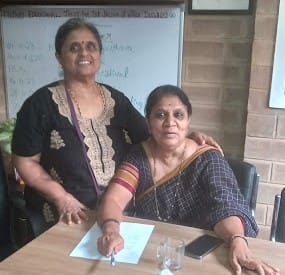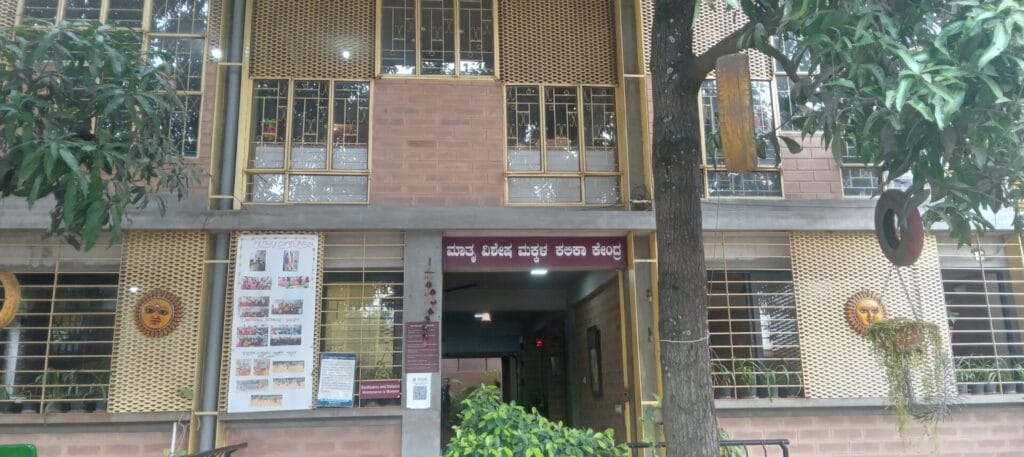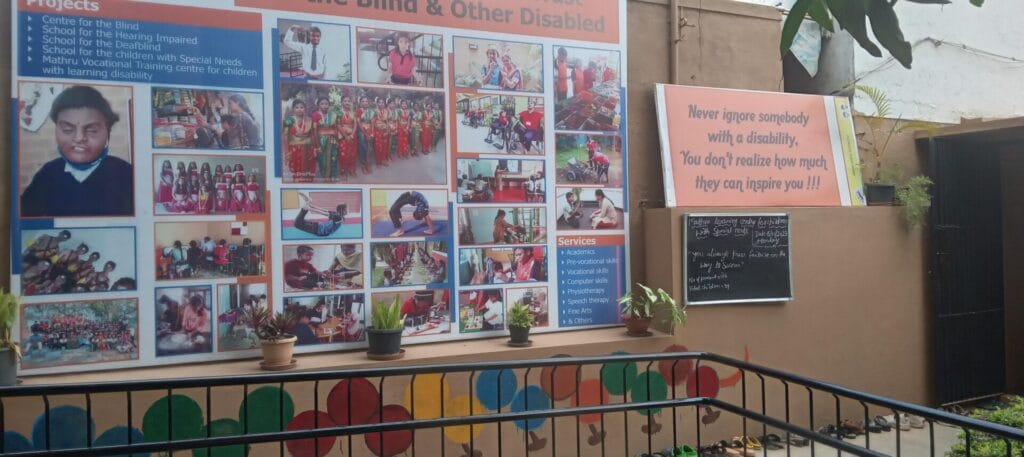Mathru Educational Trust for the Blind and Other Disabled, established on January 15, 2001 by Muktha Gubbi, emerged at a time when her life was marked by various challenges that almost led her to despair. She met with a freak accident, in which she lost half of one foot and a close relationship ended, thereafter.
Witnessing a young mother struggling to take care of her blind toddler inspired Muktha to start the Mathru Residential School for the Blind in her time of adversity. Since its inception, the school has empowered countless visually impaired students, who have meritoriously passed out of Mathru school.
Mathru now runs three centres in Yelahanka Hobli and a centre for children who are deaf/blind at D J Halli. Every time I meet Muktha, I see she has added new sections, made infrastructure changes or added employees.
Read more: Beautiful minds: Empowering artists with autism
Muktha recently opened a new branch where she runs a centre for children with multiple sensory disabilities and children with learning disabilities who could benefit from early intervention. It was inaugurated around the pandemic. Though the centre is located on a bustling main road of Yelahanka, passing through its refreshing front-yard, adorned with two huge mango trees, visitors are transported to a serene space. While donors and well-wishers contribute whatever they can to help her run the school efficiently, Muktha creatively utilises them at the right places and enhances the building’s beauty and aesthetics.
The children are taught to respect cleanliness and orderliness. Everything in its place and a place for everything! The physiotherapy section is well equipped with all the latest aids and the trainers and teachers are dedicated, passionate and efficient. Muktha has also empowered scores of visually impaired, partially visually impaired and normal women by training, educating and giving them opportunities to serve her institution.
In this interview, Muktha talks about her journey as an educator and about the needs and realities of the community. Excerpts:
What motivates you to keep expanding the institution?
When I started the school for the blind with just two or three children in my small house, I never imagined that it would grow into such a huge institution.
When I saw my work making a small difference in the lives of children and families, I could not stop taking in more and more children. Society is full of people who need intervention and support from such institutions, which are still not enough to cater to all of them. This is just my contribution to society.
Why did you branch out to other fields like educating the hearing impaired, children with multiple sensory disabilities, children needing early interventions, slow-learners, children with learning disabilities, autistic and children with cerebral palsy?
Each type of disability has unique challenges. Among them all, I believe individuals who are blind are able to confidently lead independent lives, with least intervention. One of my teachers, who was partially blind, was so independent that she could travel all the way from Yelahanka to Bangalore University by public transport, to pursue her MA. She was proficient in handling computers and the recording studio confidently. Many visually impaired students who have graduated from Mathru have secured good jobs and settled down.
When I got an acre of land from the Government at Srinivasapura, I thought I should now focus on the others and started a school for the hearing impaired. Seeing the response from these children, my heart melts for them and today we have 67 of them, brimming with enthusiasm to learn.
When did you start the third centre for children with multiple sensory disabilities, autism, cerebral palsy, learning difficulties and others?
About eight years ago, I started this centre at Srinivasapura with a few children. A few good Samaritans donated a plot of land in Yelahanka and I got a separate building constructed for this centre just before the pandemic. Today, we cater to 42 children with varied disabilities here.
Then the Karnataka government requested me to take over the centre for deaf/blind at DJ Halli, which was in a pathetic condition. I am a stickler for cleanliness, aesthetics, hygiene and orderliness and maintain all my centres spick and span because I want children to love coming to school and feel confident. Thus, the centre at DJ Halli too got a total facelift after I took over. The beneficiaries are happy now.
The children are trained in various ways, including speech therapy, to enable them to live as normally and as independently as possible. Could you tell us about how it has impacted their lives?
For a mother who sees her eight or nine-year-old child just sitting up on his own is in itself a great moment, because she saw him lying down all those years! Another mother is overwhelmed to hear her child address her as ‘amma’, as making her talk was a big challenge. My aim is to just give some respite to the parents who have to handle children with so many challenges for 24 hours, all their lives and see some smiles on their tired and depressed faces. The progress of each child is at varying pace and a very difficult journey. The teachers, trainers and caretakers need loads of patience and compassion. Their service is most noble.
How do you raise funds for the schools?
The schools are all run mostly by donations. The school for the hearing impaired has 67 children, the centre for children with multiple sensory disabilities and learning disabilities has 42 children, and the centre giving occupational training to physically challenged persons has 26 persons, out of whom there are 8 deaf-blind persons. All the hearing-impaired children, and a few of the physically challenged persons, are accommodated in the hostels. The Centre at DJ Halli provides home services to 14 children with severe disabilities, besides running a day care centre for deaf and blind children with multi-sensory disabilities. Nutritional supplements are also administered to the children.
We have 57 staff members, including special educators, physiotherapists, speech therapists and 187 children. Around 200 people in all are served meals every day.
Read more: A few small steps can make public spaces inclusive for neurodivergent people too
Do you charge fees?
I used to run the institution totally free of cost, depending upon donations from well-wishers all these years. During the pandemic, I did face financial difficulties and now after starting the new centre for children with multiple sensory disabilities, we run two buses to pick up and drop these children, as it is a day care centre. We collect only the transportation fee from most parents and some parents contribute nominal sums like Rs.10,000 or Rs.15,000 per annum, voluntarily.
Testimonials from parents
- “My son Vijay Gowda was born deaf and mute. He has been with Mathru for the last 11 years, since pre-primary class. He is now in the 10th standard. We are blessed to have found Mathru school for him. He cried so much on the first day when we left him at Mathru. But today, he loves his teachers and Muktha more than me. The school focuses not just on the syllabus but also the children’s all-round development. The hostel, food and everything at Mathru is of high standards. He is growing into a responsible, compassionate and confident individual. Whenever he comes home for his holidays, he helps us in our household chores. I am very grateful to Mathru, Muktha madam and all the teachers, right from Shobha who was my son’s first teacher. Everything is offered free, including medical care for small illnesses,” says Vijay’s mother.
- Lavanya is 15 years old. She is a slow learner and was very scared. She was made fun of in the school she used to go to and would not even climb stairs without our support. Today, after spending 3 years at Mathru, she has become very confident and cheerful. She mingles with other children, walks and climbs stairs independently, even sings karaoke. “She loves her teachers and Muktha madam more than her own mother.” says her grandfather Keshava Rao Patil.
- Pallavi, mother of Monish Gowda, a hearing-impaired child, says, “My son used to go to another school earlier but we did not like the ambience and method of training there. He had to sit in a combined class with normal children and hence got no special attention. After I heard about Mathru, we admitted him here. He is in the 3rd standard. He has improved a lot after coming here. He participates in cultural activities too. He is enjoying school. I have recommended this school to two of my friends and they have admitted their children here. All the staff members are so loving and cooperative.”
- Shilpashree, mother of baby Nakshatra, gives a moving account. “When Nakshatra was born, the doctors said she may not survive long. She was diagnosed with cerebral palsy. She is now 7 years old. We are from a village near Doddaballapur. After I heard about Mathru, we shifted to Bagalur and admitted Nakshastra to Mathru. Their pre-admission assessment is itself so professional and detailed. Today, she has improved a lot. She talks and communicates better. She gets up from the sofa and stands independently. Muktha madam ensures that these children are treated like normal children with the right amount of love and discipline, just to make them independent and confident. When I saw my daughter dance, sitting on her wheelchair during the annual day celebrations, I was stunned. I never imagined this could happen. The school organises varieties of activities and the children mingle with each other so well. They are taken to parks, malls, temples and farms. I am very grateful to all the staff members right from the caretaker to Muktha madam.”
- Yashoda, mother of 11-year-old Chethan, says, “He has been at Mathru since his 4th year. He has improved a lot. He is afflicted with cerebral palsy. We pay only the van fees but they take care of him with so much love and compassion. They even feed the children, who cannot eat on their own, clean up children, who cannot go to the bathroom on their own and train them based on each one’s limitations.”
Muktha goes to any extent to make the lives of the less fortunate persons of her institution, comfortable, dignified and peaceful. She sometimes does all the duties when there is a crisis, including cooking, though she herself is partially handicapped.
Visit mathrufordisabled.org for details
Address: Mathru Educational Trust for the Blind. 4th Cross Road, 4th Phase, Yelahanka New Town, Bangalore-560064


